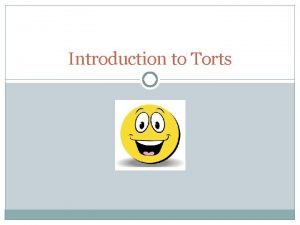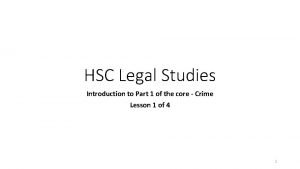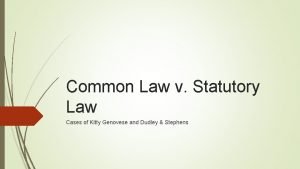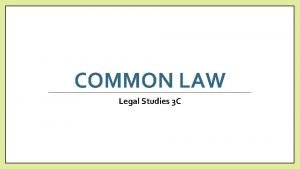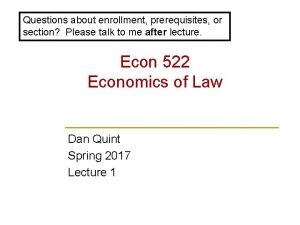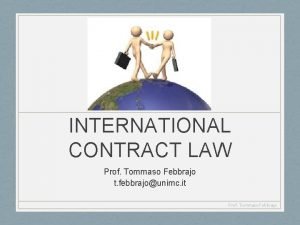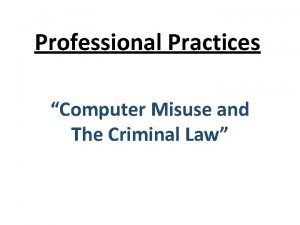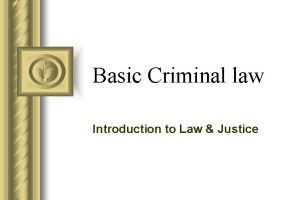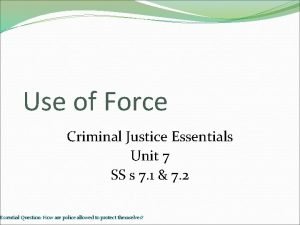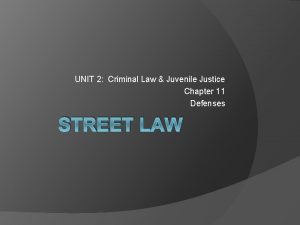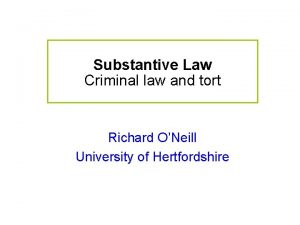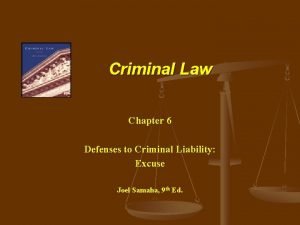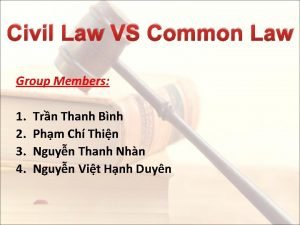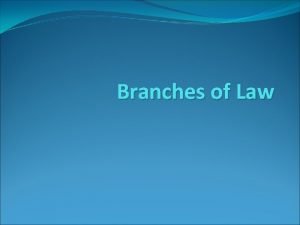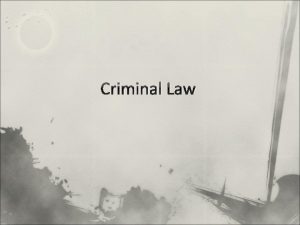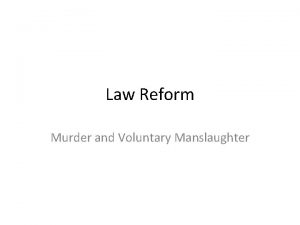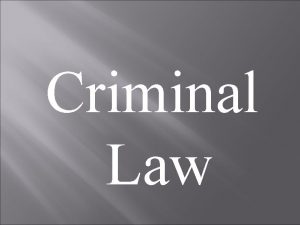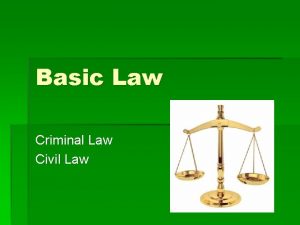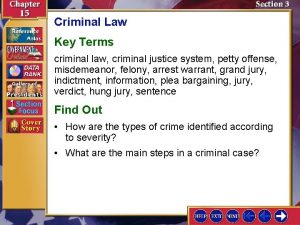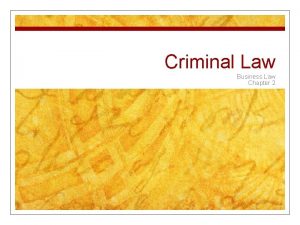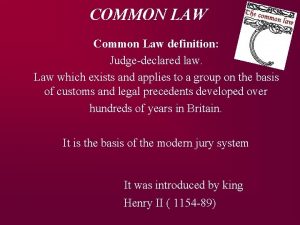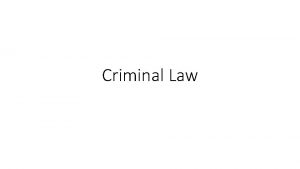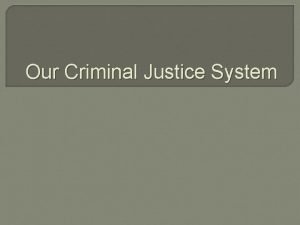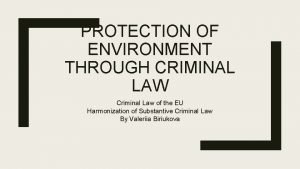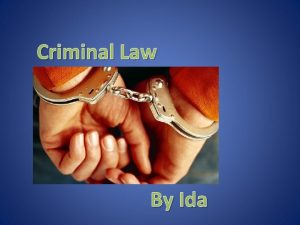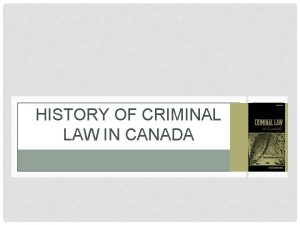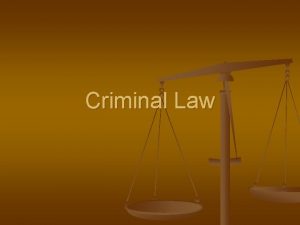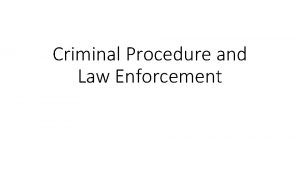Legal System HK common law legal system Criminal



















- Slides: 19

Legal System HK: common law legal system

Criminal Law 刑事法 - society (prosecution) vs. individual (defendant) - defendant presumed innocent until proven guilty - burden of proof: prosecution (government) to prove the guilt of the defendant beyond reasonable doubt - punitive, e. g. fine, imprisonment

Civil Law 民事法 n n n Individual vs. individual (natural person or legal person) Burden of proof: balance of probabilities Compensatory: damages

Sources of law (in hierarchical order) Basic Law 基本法 http: //www. info. gov. hk/basic_law/flash. ht ml (enacted by National People’s Congress 全國人民代表大會 (NPC)) - ordinance 條例 (enacted by HK Legislative Council 立法 會 (Leg. Co) http: //www. justice. gov. hk/blis. nsf/Cur. All. E ng. Doc? Open. View&Start=553. 1. 2&Count =25&Expand=553. 1#553. 1 -

- subsidiary legislation 附屬立法 http: //www. justice. gov. hk/blis. nsf/Cur. All. E ng. Doc? Open. View&Start=553. 3&Count= 25&Expand=553. 3#553. 3 (enacted by bodies so authorized by Leg. Co; subject to Leg. Co’s disapproval) http: //www. justice. gov. hk/blis. nsf/e 1 bf 50 c 09 a 33 d 3 dc 482564840019 d 2 f 4/ed 5 b 273 24963 d 7 e 24825691 f 002 e 637 c? Open. Do cument

Sources of law (continued) - equity 衡平法 substance common law 普通法 formality customary law 習慣法 Qing Code 大清律例(only concerns management of land in New Territories villages)

Courts in HK (in hierarchical order) - Court of Final Appeal 終審法院 - Court of Appeal 上訴法庭 - Court of First Instance 原訟法庭 - no upper or lower limit in its civil or criminal jurisdiction 司法 管轄權 - jury 陪審團 trial for all criminal cases

Courts (continued) - District Court 區域法院 - civil: $600, 000 - criminal: 7 years - Magistracy 裁判法院 - only criminal: 2 years - Small Claims Tribunal小額錢債審裁處 - civil: $50, 000 - Standing Committee of the National People’s Congress (NPCSC) 全國人民代 表大會常務委員會

Right of Abode 居留 權 1 st issue - whether the Immigration (Amendment) Ordinance was in contravention with Basic Law Article 24 and therefore invalid - What do you think?

- What did the courts say? - Court of First Instance – No Court of Appeal – No Court of Final Appeal - Yes

nd 2 - issue Could CFA decide the issue on its own without first asking NPCSC for its interpretation? Have a look at Articles 158, 22 & 24 and what do you think?

- What did CFA say? - Principal BL provision in issue was Article 24, not 22, and 24 was within the autonomy of the SAR

rd 3 issue: what is to be done? n n After the Jan 1999 CFA decision in favour of the Right of Abode claimants, the government claimed in April that 1. 67 million will be entitled to come. HK would face enormous pressure in coping with this huge increase in population. The community then debated on what should be done.

1 st option n Amendment of Basic Law - details of the proposals vary - Democratic Party 民主黨 and Human Rights Monitor 人權監察 proposed that the amendment should not have retrospective effect and therefore about 690, 000 would be still able to come

2 nd option Reinterpretation by NPCSC Legal Argument: - NPCSC has the power to interpret BL under the Chinese Constitution and BL 158 (counter argument: such power of the NPCSC may only be exercised according to procedures set out in BL 158) - Chief Executive has the authority to refer the case to NPCSC for reinterpretation by virtue of BL 48(2) (counter argument: no)

nd 2 option (continued) - - NPCSC’s authority is analogous to that of a court and the referral analogous to appeal to a higher court. Therefore there is no issue of retrospectivity and all 1. 67 million can be denied. Practical: All 1. 67 million can be denied.

3 rd option - n CFA decision should be allowed to stand legal issue: - both amendment of Basic Law and reinterpretation by NPCSC are legal

What happened at last? HK government eventually chose reinterpretation. (What would you choose? ) - NPCSC reinterpreted BL 24(3) to the effect of denying all 1. 67 million their right of abode on 26 June 1999.

CFA’s stance In December 1999, CFA, in another case, decided that the NPCSC reinterpretation was constitutional, and, therefore, binding. (Lau Kong Yung v. Director of Immigration ) http: //www. info. gov. hk/jud/guide 2 c s/html/cfa/judmt/facv_10_11_99. ht m
 Difference between civil law and criminal law
Difference between civil law and criminal law Difference between civil law and criminal law
Difference between civil law and criminal law Factors affecting criminal behaviour legal studies
Factors affecting criminal behaviour legal studies What are statute laws
What are statute laws Doctrine of precedent
Doctrine of precedent Common law and civil law
Common law and civil law Examples of civil law
Examples of civil law International contracts
International contracts How to prevent computer misuse act
How to prevent computer misuse act Concurrence in criminal law
Concurrence in criminal law Taser 7 nomenclature
Taser 7 nomenclature Criminal law and juvenile justice unit 2
Criminal law and juvenile justice unit 2 General defences in tort
General defences in tort M'naghten test elements
M'naghten test elements Difference between civil and criminal law table
Difference between civil and criminal law table Difference between civil and criminal law table
Difference between civil and criminal law table Define substantive criminal law
Define substantive criminal law Involuntary manslaughter examples
Involuntary manslaughter examples Causation in criminal law
Causation in criminal law Diminished responsibility in criminal law
Diminished responsibility in criminal law

